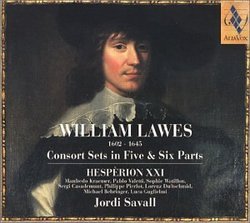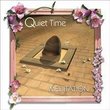| All Artists: William Lawes, Jordi Savall, Hesperion XXI Title: William Lawes: Consort Sets in Five & Six Parts Members Wishing: 1 Total Copies: 0 Label: Alia Vox Spain Release Date: 8/13/2002 Album Type: Import Genre: Classical Styles: Opera & Classical Vocal, Historical Periods, Early Music Number of Discs: 2 SwapaCD Credits: 2 UPC: 7619986098234 |
Search - William Lawes, Jordi Savall, Hesperion XXI :: William Lawes: Consort Sets in Five & Six Parts
 | William Lawes, Jordi Savall, Hesperion XXI William Lawes: Consort Sets in Five & Six Parts Genre: Classical
Lawes's "sets" are actually suites for five or six viols with an organ playing "underneath" them. Each shortish set is broken into even shorter parts: Fantazy, Aire, Paven, etc.--and while the formula remains essentially ... more » |
Larger Image |
CD DetailsSynopsis
Amazon.com Lawes's "sets" are actually suites for five or six viols with an organ playing "underneath" them. Each shortish set is broken into even shorter parts: Fantazy, Aire, Paven, etc.--and while the formula remains essentially the same, the textures and harmonies are constantly changing, with dissonances and conversations between and among the various strings giving the works great variety. On these two beautiful CDs (the first devoted to Five parts, the second to Six), Jordi Savall and Hesperion XXI play on a pair of violins, four viols, and organ, offering great contrast and flavor and making us aware of just how energetic and fascinating counterpoint can be. The colors the six (or seven) musicians get from their instruments and the interplay among them is fantastic; the playing is superb. Fans of any type of chamber music will want to hear what this underrecorded composer who died too young (43) added to the genre. It's as if he created a new language, one that seems to have been waiting to be heard. A lovely, thoughtful couple of hours of music-making. --Robert Levine Similar CDs
|
CD ReviewsA music that -almost- changed the world A. Enochsson | Sweden | 02/16/2003 (5 out of 5 stars) " William Lawes was Charles I favourite musician. Charles was a big fan of the music of his time and a highly accomplished gambo player. He was not however a politician. Spending lawisly sums on partys and patronising the arts seemed like a good idea to the court that sourronded him, but the puritan mercant class hated him, his catolic ways and above all his spending. This tension ended with the king abolishing the parlimeant and going to Oxford with his men. Admist this lived William Lawes. He inhabited a musical enviroment. The music he constructed was understood and appriciated by a few but the king. Lawes is deep and highly original. His very diffrent music more reasemblens 20Th century art music than 'classic' classical music. What one must have in mind when confronting the music is that this was a higly experimental time. Everything in this time was new and unproven and the music there and then was in a state of explosion. William Lawes went far benoyd the avantgarde of early barock however. His music concentrates on several harmonis rather than one, and this creates a deep, diffrent music: somewhat like a full bodied wine. Lawes music contrastes against how the western classical music later developed. One reason was that it was too complicated for the mainstreem listners. The other reason has to do with the situation Lawes lived in. He spend a year or so in Oxford while the king waged a civil war. He was 43 years old and in a creative bloom. His best freind wrote in a diary, that was preserved, about Lawes. In it he tells in a often annoyed tone of voice about Lawes who braveld over: 'I have a musical world that will change this world, inside this head.' Lawes followed his king in a major battle soon after. Having been forbidden to show his face anywhere near the fighting, he anyhow rushed out on the feilds to show his king his patriotism, and got shot in the head after a minute or two. Lawes friend writes that the king couldn't belive his ears when he heard that Willam Lawes was dead and Charles where deeply saddend by it. Charles I was beheaded not long after by Oliver Cromwell, who began his military dictatorship by outlawing music performing and theatrical plays. Music got back, eventually, but Willam Lawes was forgotten. Untill now. The epithet on his urn in England (Salisbury Cathedral) tells a lot about him "Concord is conquered, in this urn there lies The Master of great Musick's mysteries: And it is a riddle, like the cause, Will Lawes was slain, by those whose wills were Lawes". " A wonderful genius Andrzej Kozlowski | Japan | 11/10/2004 (5 out of 5 stars) "This is truly moving and profound music by the wonderful but still not very well known genius William Lawes. You can find here both the highest level of contrapuntal skill, on par with such masters of polyphony as Byrd, Gibbons or Bach, and a unique "cavalier' spirit, quite unlike anything I have ever heard elsewhere. The performance is superb. I have two other versions of these works, performed by Fretwork and Phantasm, which are both excellent but don't quite move me the way Savall and Hesperion do. Out of well over 2000 "classical" CDs I own this certainly is one of my 10 "desert island" favorites." Starter kit for English consort music David I. Cahill | Beijing, China | 08/21/2006 (5 out of 5 stars) "This is one of the great recent recordings of English consort music by the leading ensemble of viol musicians, Jordi Savall and Hesperion. For a time this was my favorite recording in my 2,000+ collection of classical music from all periods, until it was supplanted by Savall & Hesperion's recording of John Jenkins' awesome "Consort Music for Viols in Six Parts" (now sadly and inexplicably unavailable). Also unfortunately no longer available are two more recordings (if you can find them) I'd recommend for those entranced by Lawes and Jenkins, by the divinely inspired Christoper Simpson, "The Monthes" (Sonnerie, Veritas 7243 5 45281 2 5) and "The 4 Seasons" (Les Voix Humaines, Atma ACD 2 2182). Simpson's music, along with Purcell's, shows the growing spell cast on the English by the Italian trio sonata, but his music flows out of the same consort tradition."
|

 Track Listings (16) - Disc #1
Track Listings (16) - Disc #1

